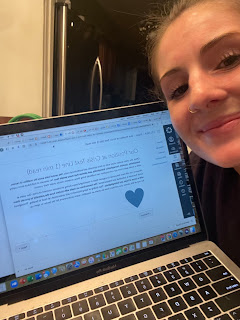Beginnings of Community Service
For my first post, I'd like to share with y'all a little about the community service I've started to get involved in. I went to Tulane for my undergrad, so community service is not an aspect of my education that I'm unfamiliar with: all throughout college I volunteered as a tutor for local high school students, and I was able to help many New Orleans teens with homework, reading, school projects, ACT prep, etc. I enjoyed this service because I felt that it really connected me to the community that I belong to, but it also opened my eyes to many of the disparities in education that are present here. Back in California where I'm from, I attended public school my whole life -- so it surprised me even more that private school students here did not seem to have access to the same level of education that I did even having attended public school. This was just one of the many times that I realized my own privilege as a "transplant" living in New Orleans.
For my service this year, I originally planned to volunteer as a medical advocate for sexual assault survivors with the New Orleans Family Justice Center. This is a program through University Medical Center, where, after significant training, advocates are on-call for 24 hour shifts to advocate for survivors of sexual assault that arrive at UMC. Advocates walk survivors through the medical and legal processes that occur after sexual assault, and support survivors throughout this scary situation. I wanted to do this because as an EMT, we frequently see patients that have experienced sexual violence, and I wanted to be able to better care for these patients and understand the "what happens next" process in more detail. Unfortunately, the next training was not to be held until January, so hopefully I can do this program for my service next semester!
So, I decided instead to be a Crisis Text Line volunteer. Similarly to why I wanted to be a medical advocate, a significant amount of calls we receive at West Jeff EMS are psychiatric emergencies, and I want to be better equipped to handle these calls and be there for patients that are scared, upset, and in distress. I've been called to suicide attempts, anxiety attacks, patients threatening to jump into oncoming traffic, etc, and while I feel like we can all sort of do our best to help these people -- saying things like "it's okay, you did the right thing to call 9-1-1" or "don't worry, you'll get the care you need, it all gets better from here" -- I really want to understand on a deeper level how to help people in these situations. Mental illness and depression really do feel all-encompassing, and often patients feel like there's truly no way out. I want to be better at calming patients down, speaking in a comforting way, and using words that really can make a difference in how these patients are feeling.
In order to be a Crisis Text Line volunteer, there's of course significant training that I need to do before I can work the text line. For the past two weeks I've been focusing on completing the training modules, and have spent five hours this month so far on these. I've learned that the goal of being a text line counselor is not to offer advice or words of wisdom, but more to guide the conversation and allow the texter to come up with his or her own solutions to best fit his or her needs at the moment. It's important to be collaborative and allow the texter to explore their options so that they can figure out the best way to resolve whatever feelings they might be experiencing. Many of the trainings have focused on inclusivity, equality, and equity, and I was really happy that not only did Crisis Text Line emphasize the importance of understanding these concepts, but also that so much training so far has been dedicated to recognizing that each texter will come from a different background so that our approach is not one size fits all. All texters will have different experiences and needs, so we need to make sure to give each texter our full attention and care to understand each person's unique situation and position. For example, to emphasize the concept of equality vs. equity, we did an exercise that centered around two women that each needed to go to work, pick up medicine for their children, and go to the grocery store in one day. One woman worked from 9-5 and lived two minutes from the nearest train station, and the other woman worked one job from 8-2 and another job from 3-8 but lived 30 minutes from the nearest train station. The second woman clearly would have a much harder time making it to the grocery store and pharmacy before closing (which both were to close at 9). In terms of equality, both women were given the same store hours for the grocery store and pharmacy. But in terms of equity, the second woman should be given either extended hours or a break in the day to be able to achieve the same basic daily duties as the first woman. (There was much more to this scenario than just that, but I hope that description captured the basic gist.)
Overall, I'm really excited to be learning more about how to care for people in crisis while also learning about the intersections of crisis and different people's needs during this time. I'm excited to finish the trainings and start working as a text line counselor!
Below are photos of Me in Training, and Me on the Ambulance, and Me at 3am Working a Night Shift (all circa 2022). Thanks for reading!
Total: 5 hours



Comments
Post a Comment